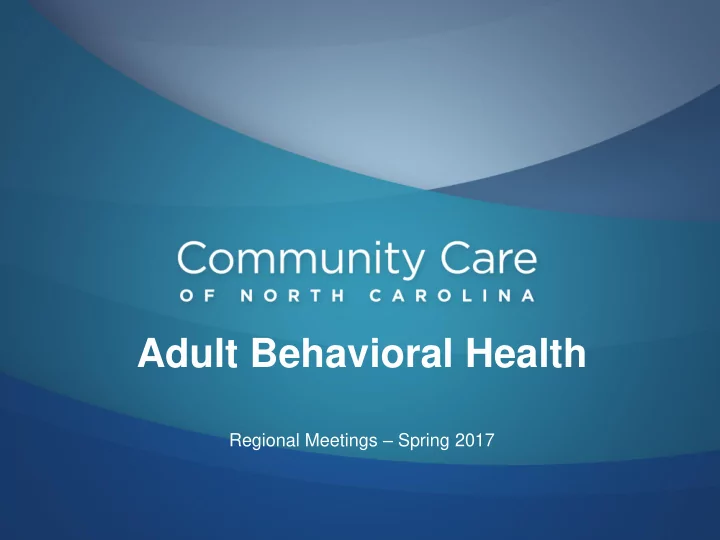

Adult Behavioral Health Regional Meetings – Spring 2017
Objectives 1. Recognize critical factors, including social determinants of health, that may impact the development and severity of behavioral health conditions. 2. Discuss adverse childhood experiences and how they potentially influence the health and well- being of individuals and their ability to successfully meet developmental tasks. 3. Describe the potential impact on the family system when one member, at a certain age or phase in life, has a behavioral health condition.
Erickson Stages of Psychosocial Development • Trust vs. Mistrust (Infancy) • Autonomy vs. Shame/doubt (Toddler) • Initiative vs. guilt (Pre-school) • Industry vs. inferiority (latency childhood)
Erickson Stages of Psychosocial Development- cont’d • Identity vs. role confusion (Adolescence) • Intimacy vs. Isolation (young adulthood) • Generativity vs. stagnation (middle adulthood) • Ego integrity vs. despair (late adulthood)
Behavioral Health Conditions • SAMHSA: 2014 National Survey on Drug Use and Health (NSDUH) • estimated 43.6 million (18.1%) Americans, age 18 and up, experienced some form of mental illness
Young Adulthood (20s-30s) Developmental Challenges • “Finding your place in the world” • Tough transitions – school to work, family home to independent living, making friends Common Conditions • Schizophrenia (1% US) • bipolar disorder (2.6% US) • substance abuse (8.1% over age 12 US)
Young Adulthood (2 (20s-30s) Common Effects on the Family System • “failure to launch” • Parents: what is helping and what is enabling? • Importance of recognizing behavioral health condition and associated functional impairment • prolonged financial support – increases financial stress on family; challenge achieving independence
Mid iddle Adulthood (40s-50s) Developmental Challenges • “thriving vs. surviving” • Self-care, balance vs. burnout • “Sandwich generation”, “ Kinkeeper ” Common conditions • Depression (6.7% US) • substance abuse
Mid iddle Adulthood (40s-50s) Common Effects on the Family System • Increased social, emotional and financial stress on family • legal problems – divorce, criminal charges, child custody
Late Adulthood (60+) Developmental Tasks • Mental and physical health and vitality • Coping with loss Common conditions • cognitive impairment • comorbid medical and mental health issues
Late Adulthood (6 (60+) Common Effects on the Family System • legal problems – loss of license • caregiver role – • emotional, financial, logistics • Physical (dementia, drug withdrawal, etc) • Health care advocate role (esp. for mental health system) • Burnout!!!
Questions?
Recommend
More recommend